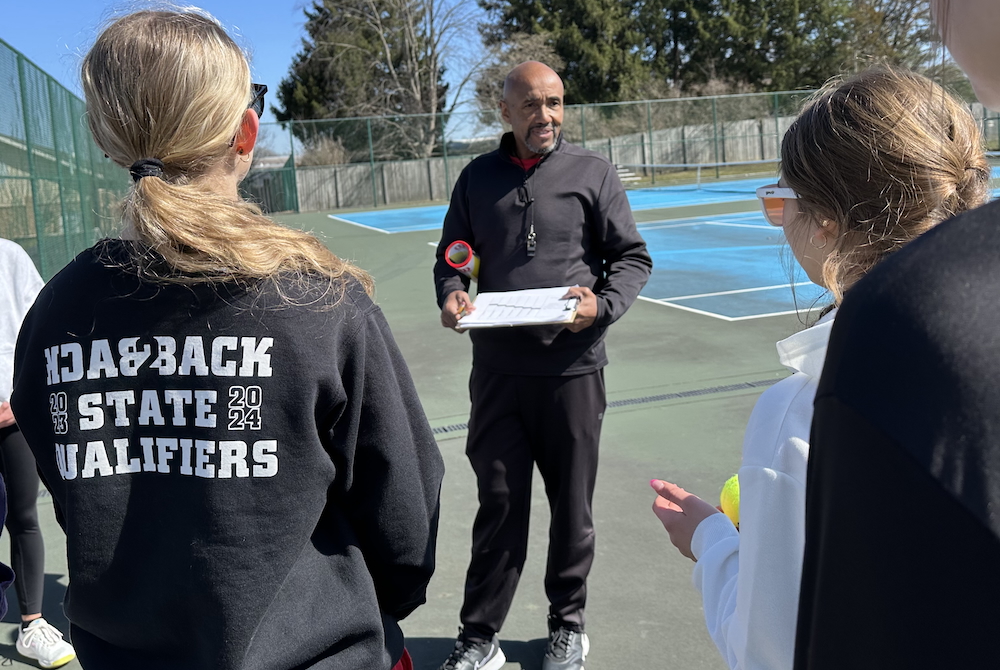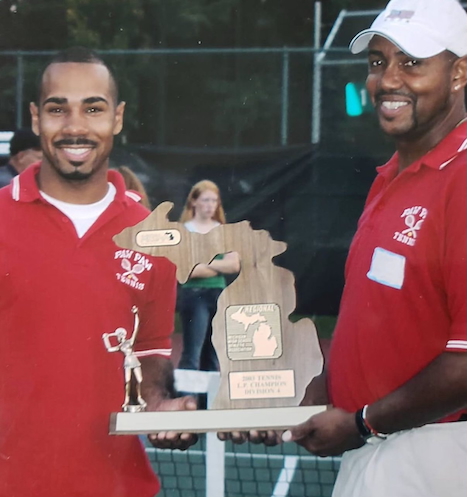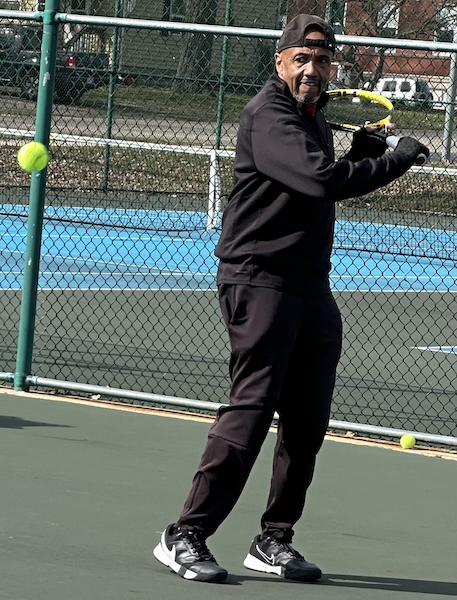
MHSA(Q&)A: Mendon football coach John Schwartz
February 2, 2012
 John Schwartz didn’t really want the Mendon football head coaching job when a group of players convinced him to take it before the 1989 season. And his first contract started out on a napkin. The rest is history.
John Schwartz didn’t really want the Mendon football head coaching job when a group of players convinced him to take it before the 1989 season. And his first contract started out on a napkin. The rest is history.
Mendon won its 11th MHSAA football championship this fall, downing Fowler 33-0 in the Division 8 Final, to tie for third-most football titles won by one program. Schwartz has coached in the program for all 11, including 10 as head coach, and his record of 236-39 gives him a winning percentage of .858, tops in the MHSAA record book. He recently was selected as this year’s recipient of the high school Duffy Daugherty Award, annually given for career contributions to the game. He follows recent winners Ralph Munger of Rockford and Herb Brogan of Jackson Lumen Christi.
His Mendon teams have had just one losing season. And although he retired a year ago after 36 teaching middle school science, and then fought off cancer over the summer, he has no plans to leave his post on the Hornets’ sideline.
How would you characterize your program?
I think we have very good coaches and I think the kids respect the coaches, and they know the coaches think more of them than just being football players. They care about them. We have their attention, and what we really try to do is form a team concept as soon as we can. We try to stay away from giving any one person too much recognition. We don't give out MVP awards at the end of the year. It's a program where we're all in it together: coaches, kids and community. We try to get the best out of the kids, give the kids the best shot we have at being the best we can be.
How does a small school continue to reload every season?
My first year there, the first thing I did as a head coach was I started the junior high program. I think that's where everything starts. We even have the younger kids called the rocket kids, and those coaches come in and talk about (football) terms so when kids move from one level to another there's no re-teaching. Everyone has an ego, coaches have egos, and they like to do some things differently. But we don't have that. They do what we do. We give them a lot of flexibility, but we have certain drills we want to run. By the time we get them, these kids are in tune with what we are doing. The summer program also is something I started my first year as head coach too. ... It means that during the season we can concentrate more on teaching than conditioning.
You went from 3-6 in 2006 to 12-0 in 2007. Explain how you bounced back.
The losing season we had, we didn't have a lot of kids, and our two best kids were hurt early in the season and couldn't play. We never did bounce back. Even in that season, we were ahead at halftime in all but one game. We just didn't have enough to come back and pull the game out, and we had some very tough games. It wasn't a good season, but I thought those kids played awfully hard for what we had. We got a lot of experience, and it paid off the following year.
Our JVs practice with the varsity. When I work with inside linebackers, I work with (grades) 9-12. Kids learn quicker from kids than from coaches, as far as I'm concerned. ... Football's really changed. It's become a lot more complex. I think we have to delegate more and more every year so we can stay with the changes. It's too much for one person. I remember my first three, four or five years it was just three of us at the varsity level. The other two, neither one taught at the school. We were pretty successful right off the bat, and we started getting more and more interest from people. Now 9-12 we have seven coaches, and we have three at the junior high, and all the coaches but two have played for me. They know what I expect, what I'm looking for, what I want. ... And they want to win. I'd be lost without those guys.
Are there certain seasons that have meant more than others?
The first year I took the job, in 1989, we went undefeated and won a state title. A lot of those kids are very good friends of mine yet, and they're pretty special to me. They were a big boost to my program. In the '95 year, my son was a sophomore on that state title team. I remember a lot about that team.
They all have something they did very well. They either threw the ball well or played great defense or had a big line. When I hear a year now, I think about those teams.
You grew up in a small town (Colon) and have taught and coached in a small town. Was that important for you to do?
I've never taught anywhere else. I never felt I really had a reason to leave. I've gone through at least six superintendents since I've been there. The fourth or fifth said to me, "The only thing that bothers me about Mendon is these people think an awful lot of winning. There are other things." He asked me, "How do you feel about it?" I said, if they didn't feel that way, I wouldn't be here.
Who was your biggest coaching influence?
I would say Morley (Fraser, Jr., under whom Schwartz was an assistant for three seasons). Years before I got there, Mendon was pretty good in the early 70s, and then in the mid 70s football wasn't very good. I was the JV coach the first year, and the second year after two games they brought me up to varsity. The best thing I did was I told them I would not take the head job, but I'll assist. I knew (Fraser) was the kind of person and personality we needed there. It wasn't necessarily all of his football knowledge, but his energy and excitement that he brought to the game.
You said during the Finals postgame press conference that you'd battled cancer during the summer. How did you come back, and did you ever think that might be time to step down?
Everything's fine. I had coaches that took over. At the same time that that happened, I was retiring. If you retire in Michigan, you can't be at the school for one month. So I couldn't be at summer weights all the way through June. So my coaches did all the summer weights. But I had no intention of stepping down. If something (bad) came down ... but once they said they got it, everything went as normal.
After a championship season, how do you ramp things back up for the next fall and a new group of players?
When we go to the playoffs, we take all the JVs unless there are couple who don't want to go. They experience that and get an extra five weeks of practice if we win a state title. And they're excited about it. They want to do that. They’ve' tasted it, and they want a part of that the next year. We remind them it's not what you did, it's what can you do for me now. ... This is your year.
We talk about winning state championships from day one. A lot of people say we shouldn't do that, but why not? Isn't that the ultimate goal? I can't imagine telling a team we think we could be 7-2 this year. We expect to be 9-0 every year. Of course, that's not going to happen. But at same time, I think the losses make you better the following week. We've won state titles where we haven't won the league title. ... You get better.
PHOTO: Mendon coach John Schwartz talks things over with his players during the Hornets' 21-14 win over Decatur in the 2002 Division 7 Final at the Pontiac Silverdome.


Vicksburg's Offord Jr. Beginning 50th, Final Season Coaching Teams to Net Gains
By
Pam Shebest
Special for MHSAA.com
March 26, 2025
VICKSBURG — Warner Offord Jr.’s was hardly impressed the first time he played tennis.
 That was 55 years ago, when he was heading into his sophomore year at Paw Paw High School.
That was 55 years ago, when he was heading into his sophomore year at Paw Paw High School.
Still, he continued to play with neighbor boys all that summer, and figured it would end there – until the following spring sports season, when he joined the tennis team.
“I go, it’s not a bad sport after all,” he laughed.
Offord ended up at No. 1 singles his final three years at Paw Paw, graduating in 1973.
Now, at age 70, he is ready to retire at the end of the upcoming Vicksburg’s girls season after 50 years of coaching tennis.
After graduating from Paw Paw, Offord stayed in the area, helping the basketball team and coaching boys and girls tennis there. He coached at his alma mater 28 years, first as an assistant before taking over the tennis programs.
When he heard about a basketball coaching opening at Vicksburg 22 years ago, he applied for the job.
He did not get the head hoops gig, but athletic director Mike Roy offered him a job coaching the girls tennis team.
“I said I’ve got to talk to my wife (Linda Connor-Offord),” Offord said. “I don’t do nothing without talking to my wife, or I’ll be in the doghouse.”
Two days later, the boys tennis coach resigned and Roy offered Offord that job as well.
 Once again he consulted his wife, who he gave him the thumbs up.
Once again he consulted his wife, who he gave him the thumbs up.
Offord soon discovered there is a bit of a difference between coaching boys and girls.
“Girls are feisty,” he said. “Girls listen to you. Boys, sometimes they want to do their own thing. When they do that, I say ‘end zone to end zone’ and then they get back to, ‘OK, we’re going to listen to our coach now.’”
He also has rules on the court.
“I believe in discipline. If you curse on the court, it’s an automatic two miles,” he said. “If you throw your racket, it’s an automatic two miles.
“No matter what, we’re going to run. I try to get the kids in shape for the third set.”
With the girls season just underway, Offord has some definite goals.
“We’re going to try to win (Wolverine) conference for the first time in school history,” he said. “The boys did it last year for the first time.
“Before I leave, I’d like to bring home that Regional trophy for the girls. It would be nice to bring home that trophy my last year.”
He is also challenging the girls not only to get back to the MHSAA Finals, but to improve on last year’s finish.
“Two years ago we finished 18th (in Lower Peninsula Division 3). Last year, I told the girls, let’s get up to 15th of 24 teams, and we got 14th.
“This year, if we go to state again, I’m going to tell then, let’s get down to 10.”
Game changer
Offord said today’s high school players are faster and stronger than when he picked up tennis because they use the weight room and do conditioning.
The equipment also has evolved.
“If I had the racket they have now and I could take that back in the ’70s, the racket is so big,” he said. “I had an Arthur Ashe (wooden) racket, I had a Wilson T3000 racket, I had a Kramer and I had a Davis.
“The technology now is unbelievable.”
Offord, who is affectionately called “Doctor O” or the abbreviated “Doc O” by the Vicksburg community, has changed with the times.
 “Dr. O’s unwavering passion and exceptional dedication have transformed the program,” Roy said. “His deep understanding of the game, paired with his ability to teach strategy at an elite level, sets him apart.
“Dr. O’s unwavering passion and exceptional dedication have transformed the program,” Roy said. “His deep understanding of the game, paired with his ability to teach strategy at an elite level, sets him apart.
“Beyond his technical expertise, Dr. O instills a culture of excellence by holding athletes to high standards while maintaining fairness, consistency, and approachability – earning the trust and respect of his team.”
Roy noted that Offord has support around him.
“Since taking the reins, Dr. O has cultivated a winning culture, building on the foundation laid by coach Scott Wills, who continues to lead our summer youth programs,” Roy said.
“Recognizing the importance of strong leadership, Dr. O brought in Nick Foley, a former standout at Sturgis, as his assistant. Together these three men have ignited a culture shift, elevating the team to compete at an exceptional level. Their collective vision, tireless work ethic and commitment to growth has positioned the program for sustained success.”
Offord said he learned from the coaches he had growing up, who instilled not only a competitive spirit but confidence in playing and acceptable conduct on the court.
He mentioned retired Allegan tennis coach Gary Ellis as a mentor.
“Anytime I needed to know anything about tennis, I’d call him and he always had the answer,” Offord said. “I thought the world of him and what he did for that program. I’m trying to do the same thing at Vicksburg.”
Ellis said that Offord “definitely got the kids excited about playing tennis for Vicksburg and enjoying the sport. His kids get better and better during the season.”
The players at Vicksburg and Paw Paw are not the only ones who blossomed under Offord’s coaching.
His son, Warner Offord III, is an assistant to Matt Boven at Mattawan and has been a certified tennis pro for 20 years.
One final run
Offord Jr.’s decision to retire after half a century came at a perfect time, said senior Scarlett Hosner, the Bulldogs’ No. 1 singles player.
 “I feel it’s a good ending point because he coached my sister (Josephine, a 2016 grad), too, and he saw me growing up playing tennis,” Hosner said. “It’s like a full-circle moment because it’s my last year and his last year.
“I feel it’s a good ending point because he coached my sister (Josephine, a 2016 grad), too, and he saw me growing up playing tennis,” Hosner said. “It’s like a full-circle moment because it’s my last year and his last year.
“He brings really positive energy. He’s such a nice, fun guy. He makes us enjoy the game, but he can also be serious at times. When we’re not doing what we’re supposed to be doing, he’s like getting on us.”
In retirement, Offord and his wife plan to do some traveling because “we want to enjoy life while we’re young,” he said.
“It’s been a wonderful 50 years coaching tennis, and it’s going to be sad. It hasn’t hit me yet for the boys, and once the girls season is over, then it will probably really hit me.
“I take great pride in seeing my players excel professionally, academically and as an athlete. I feel good knowing I played a part in that person’s success.”
 Pam Shebest served as a sportswriter at the Kalamazoo Gazette from 1985-2009 after 11 years part-time with the Gazette while teaching French and English at White Pigeon High School. She can be reached at pamkzoo@aol.com with story ideas for Calhoun, Kalamazoo and Van Buren counties.
Pam Shebest served as a sportswriter at the Kalamazoo Gazette from 1985-2009 after 11 years part-time with the Gazette while teaching French and English at White Pigeon High School. She can be reached at pamkzoo@aol.com with story ideas for Calhoun, Kalamazoo and Van Buren counties.
PHOTOS (Top) Vicksburg girls tennis coach Warner Offord Jr. talks with his team at the start of this spring season. (2) Offord and son Warner Offord III hold up their Regional championship trophy won for Paw Paw in 2003. (3) Offord hits with his players during practice. (4) Scarlett Hosner headshot. (Current photos by Pam Shebest; 2003 photo courtesy of Warner Offord Jr.)

